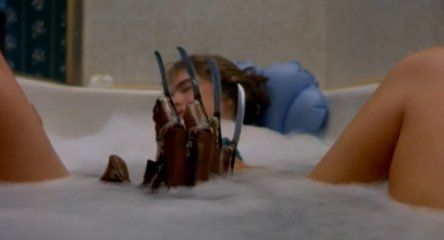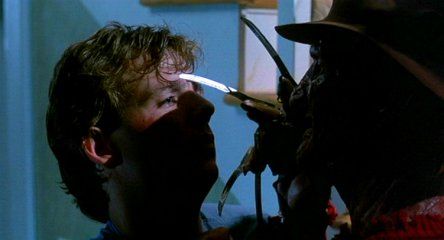You got to cut your fingernails or you got to stop that kind of dreaming. One or the other.

We're a few months away from the 30th anniversary of Wes Craven's original A Nightmare on Elm Street (which, surprisingly, was released in the middle of November, thereby missing Halloween by a couple of weeks), but anytime is a good time to revisit this '80s slasher classic. The film that introduced both horror icon Freddy Krueger and post-teenaged heartthrob Johnny Depp to the world, 1984's Nightmare gave Craven's career the shot in the arm that it needed and allowed him to take full advantage of the story's inherent dream logic. It's also smart enough to quote Shakespeare, which can't be said for the majority of films that were made during the slasher boom.
Those coming to A Nightmare on Elm Street for the first time are likely to be surprised that Robert Englund is ninth-billed as "Fred Krueger," behind the four teens whose dreams he invades (Heather Langenkamp's Nancy, Amanda Wyss's Tina, Nick Corri's Rod, and Depp's Glen), Nancy's separated parents (top-billed John Saxon and Ronee Blakley), a policeman I couldn't pick out of a lineup, and a sleep researcher played by Charles Fleischer, best known as the voice of Roger Rabbit. As a matter of fact, Englund wouldn't get star billing until the fourth entry, by which time the tone of the series had definitely shifted away from the pure horror of Craven's original conception (something he directly addressed in 1994's New Nightmare, his attempt to put a capstone on it). Just because Freddy isn't cracking wise, though, that doesn't mean the film is entirely devoid of gallows humor, as evidenced by the cop at one murder scene who tells the paramedics, "You won't need a stretcher up there. You'll need a mop."
Craven is quite judicious when it comes to doling out information about Krueger's backstory. Note the significant glance that Nancy's parents share when she describes the boogeyman in her dreams to them. And Blakley, who plays a great drunk, is flat-out terrific in the scene where she reveals all, including the fact that she kept Krueger's razor-tipped glove as a souvenir. A little less believable is the idea that Nancy could set up a series of elaborate booby traps, say goodnight to her mother, and fall asleep in the space of ten minutes (thus giving herself another ten to find her tormentor in her dream, where her watch keeps accurate time), but the dividing line between dream and reality is so porous in this and every other film in the Elm Street series that it's best just to go along with it.

Hey, you know those people who claim that A Nightmare on Elm Street Part 2: Freddy's Revenge is totally gay? Well, guess what: they're totally right. Made in 1985, but set five years after the events of the first film, Freddy's Revenge is focused on Mark Patton's Jesse, whose family has moved into 1428 Elm Street, which explains why he's prone to nightmares that cause him to wake up screaming and glistening with sweat. "Mommy, why can't Jesse wake up just like everybody else?" his sweet little sister innocently asks, but the unasked question is, "Why can't Jesse be just like everybody else?" (i.e. straight).
Jesse doesn't get much help at home, where his father (Clu Gulager) is a hardass about getting him to finish unpacking his room and his mother (Hope Lange) doesn't have the benefit of alcoholism to make her an interesting character. And he gets even less at school, where an altercation on the baseball field with bully Ron (Robert Rusler), who pulls his sweatpants down, exposing his ass during a game, gets them both in dutch with Coach Schneider (Marshall Bell), who's said to hang around the "queer S&M joints downtown" and relishes making them do pushups for hours on end with a hearty "Okay, dirtballs. Assume the position." Even if he has a quasi-girlfriend in the form of rich girl Lisa (Kim Myers), Jesse is easy pickings for Freddy Krueger (Robert Englund), who appears in his sweat-soaked dreams to say, "I need you, Jesse" and "Kill for me." Does this make Freddy the first horror icon to outsource his killings? Maybe so.
Before Jesse kills anyone, his family is menaced by their pet bird, which mangles its mate and nips Gulager in the cheek before exploding in mid-air, prompting the puzzled patriarch to say, "Animals just don't explode into flame for no reason." Wishing to cool off, Jesse heads out in the driving rain to one of those queer S&M joints he heard tell of, where he naturally runs into Coach Schneider clad in a leather vest. Next thing we know, Jesse is running laps in the school gym, and while he hits the showers, his coach is hit by a ton of sporting equipment, dragged into the shower and tied up with jump ropes, stripped bare, spanked with towels until his ass is bloodied, and finally slashed to death by Freddy, who has possessed Jesse's body. Not bad for a first kill.
In the meantime, Lisa, who found Nancy's diary while helping Jesse unpack, finds the power plant where Krueger worked, making it the perfect place to stage the climax of the film. She also offers to help Jesse, who has taken to downing pills and guzzling coffee and Coke to stay awake, but his response -- "How can you help me?" -- is very telling because when she tries to initiate sex during a pool party at her place, their coitus is interrupted by the emergence of Freddy. Fleeing the straight female that wants to "fix" him, Jesse invades Ron's bedroom and asks the jock to watch him much like Nancy asked jock Glen to watch her in the first Nightmare. "He's inside me," Jesse warns, "and he wants to take me again," which Freddy does, literally coming out of Jesse's body while a horrified Ron watches, having failed to stay awake.
Skipping over the pool party massacre, which is pretty perfunctory, the final confrontation between Lisa and Freddy takes place at the power plant, which is patrolled by guard dogs with human faces (a poor effect director Jack Sholder wisely doesn't linger over). "I'm going to take him away from you," Lisa says, talking to Freddy as if he were Jesse's lover, not the deathless boogeyman that has stolen him away from her in a different way. It's debatable whether Sholder and screenwriter David Chaskin had this interpretation in mind when they were given their marching orders by New Line honcho Robert Shaye, who wanted a sequel to his company's surprise horror hit stat, but I'm willing to have that debate whenever, wherever.